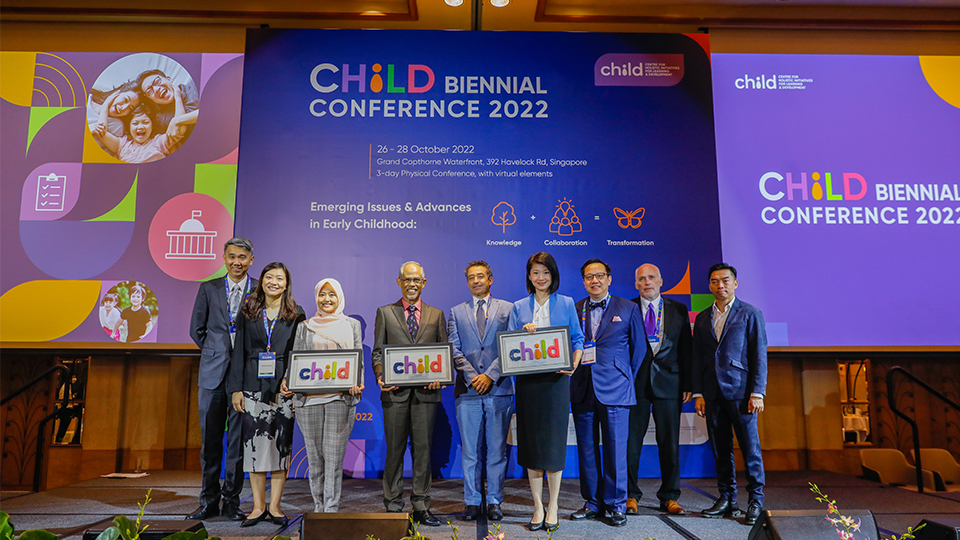CHILD spearheads the advancement of health, development and learning outcomes of young children at inaugural conference
Published: 28 Oct 2022

Caption: [Third person from left] Guest-of-Honour Ms Rahayu Mahzam, Senior Parliamentary Secretary for Ministry of Health and Ministry of Law, Mr Masagos Zukifli, Minister for Social and Family Development and Second Minister for Health and Ms Sun Xueling, Minister of State for Ministry of Home Affairs and Ministry of Social and Family Development graced the opening ceremony of the inaugural CHILD Conference.
Families with young children in Singapore can look forward to helping their children get a good start to life as policymakers, researchers, practitioners and global thought leaders in the early childhood space come together at the inaugural conference organised by the Centre for Holistic Initiatives for Learning and Development (CHILD), based at the Yong Loo Lin School of Medicine, National University of Singapore (NUS Medicine).
Held from 26 – 28 October 2022, the inaugural CHILD Biennial Conference is the first conference of its kind in Singapore focused on translating child development research into policy and practice.
Aptly themed ‘Emerging Issues and Advances in Early Childhood: Knowledge + Collaboration = Transformation’, conference participants discussed key trends, developments and research in early childhood, explored collaborations and shared interventions and policies with the aim to improve the most critical early years of children in Singapore.
The opening ceremony was graced by Guest-of-Honour Mr Masagos Zukifli, Minister for Social and Family Development and Second Minister for Health. Ms Sun Xueling, Minister of State for Ministry of Home Affairs and Ministry of Social and Family Development, and Ms Rahayu Mahzam, Senior Parliamentary Secretary for Ministry of Health and Ministry of Law discussed ways to better support women, parents and families in Singapore to bring to life a future their children deserve, at an intimate fireside chat during the conference.
Keynote speaker Professor Philip A. Fisher from Stanford Graduate School of Education outlined findings from key pieces of research conducted by Stanford Center on Early Childhood that has profound implications on the way mental health and other support services should be structured to mitigate the impact on development and well-being across the lifespan caused by uncertainty and unpredictability in the early stages of life. In particular, he outlined critical areas of strength and resilience demonstrated by families with young children during the COVID-19 pandemic and how that can inform the design of support services to young families.
Developing targeted intervention programmes that aim to improve the health and well-being of children form a key outcome of work at CHILD. An example is the ‘The Appetite Toolbox’, a new programme aimed at cultivating healthy eating behaviours early in life and which may potentially open up new ways of thinking and solutions to tackling obesity and eating behaviours of pre-school children in Singapore.
The programme, a partnership between the A*STAR Singapore Institute for Clinical Sciences (SICS), CHILD and PCF Sparkletots, is currently being trialled across six childcare centres in Singapore where children and caregivers are provided with tools designed to enhance eating self-regulation skills during preschool.
“Evidence from the GUSTO cohort in Singapore indicates that eating behaviours, such as larger serving sizes, eating faster and eating when not hungry, are associated with increased food intake and the likelihood of developing an unhealthy body weight during the preschool years. Children and adults who are more sensitive to internal hunger and fullness cues are better able to adjust their food intake in response to their needs and are more likely to have a healthy body weight. We have to start building good habits from young in order to set them up for life,” said Dr Keri McCrickerd, Research Scientist at A*STAR’s Singapore Institute for Clinical Sciences (SICS) and Assistant Professor, Department of Paediatrics, NUS Medicine and lead Principal Investigator for the Appetite Toolbox.
The work of CHILD is aligned to the Singapore Government’s Research, Innovation and Enterprise (RIE) 2025 plans on Human Health and Potential, which aims to realise the full potential of every child through improving prenatal and early childhood development and learning outcomes in schools.
CHILD, whose founding partners include NUS Medicine, Lien Foundation, Centre for Evidence and Implementation (CEI), and A*STAR’s SICS, was set up last year to lead the way in translating critical research to intervention, to improve the health and developmental outcomes of children in Singapore and beyond. The mission of CHILD also ties in well with the work of Singapore’s Child and Maternal Health and Well-being Task Force to support and help women prepare for motherhood, and help children attain good health and well-being from their early years.
An inclusive and multi-collaborative effort, much of the work of CHILD is a direct result of the Growing Up in Singapore Towards healthy Outcomes (GUSTO) study, which many of CHILD’s leads and members are involved with. The landmark study, which for more than a decade has gathered valuable data about how conditions in pregnancy and early childhood influences maternal mental health and child neurodevelopment, is a major collaborative research effort involving the National University Health System, KK Women’s and Children’s Hospital, and A*STAR’s Singapore Institute for Clinical Sciences as well as international researchers in New Zealand, the United Kingdom, and other countries.
Read more in the press release here.
News Coverage

